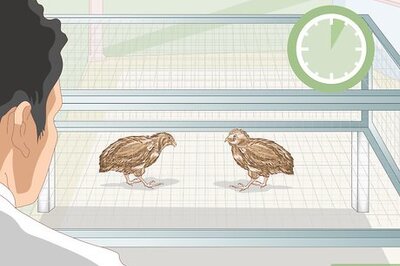
views
Purushottam Gupta’s legal fight may have been for 11 months, but the research and observations continued for decades. After 39 years of unwavering service, the 62-year-old retired Union government employee can now proudly dedicate his time to social service through the Rashtriya Swayamsevak Sangh (RSS). The redemption came after a landmark high court judgment overturned a longstanding ban on the organisation for government staff.
“Throughout my 39 years of dedicated service, I’ve witnessed my colleagues and friends being suspended or transferred simply for participating in ‘seva’ activities such as flood relief or assisting the poor, solely because of their association with RSS-affiliated organisations. I wanted to follow their path but I restrained myself in respect of the rules,” Gupta told News18 in an exclusive interview.
“I never broke rules while in service but I always wondered about the ban on an organisation that only serves people. They never ask for government aid; the volunteers spend their own money to help people. Despite maintaining unwavering professional commitment and integrity, I’ve seen these people suffer. I needed an answer,” he shared.
Gupta, who worked with the Central Warehousing Corporation, wished to participate in ‘seva’ work organised by the RSS and its affiliates in 2022. But there was a legal restriction — the ban was applicable even for pension-holders.
An avid believer in the RSS ideology, the 62-year-old could not make peace with the ‘unreasonable’ ban and decided to fight a legal battle against the Union of India. Following his research, and with support from a group of senior advocates, Gupta filed a petition before the Madhya Pradesh High Court, seeking judicial redressal and reasons behind the ban.
11-Month Battle
“I was determined to understand and challenge the unjust ban imposed on this social organisation, not once but thrice. Therefore, I appealed before the court. The high court passed a landmark judgment in my favour on Thursday. At 62, as a proud resident of Indore and a retired central government employee, I can now wholeheartedly serve my country through the RSS,” Gupta said.
The judgment is not only a personal victory for Gupta but also a significant step towards recognising the contributions of social organisations like the RSS in community service and national development.
“The court, while hearing my petition, directed the Union government at least five times to file an affidavit explaining why such a ban was imposed and why it was being continued. The Centre did not respond. The court asked the Centre to respond on July 11. However, while the case was on, the Union government issued an order on July 9, two days before its scheduled appearance, and lifted the ban. It was half victory for me then and on Thursday, with the judgment in my favour, my faith in the RSS and in judiciary stood vindicated,” added Gupta, whose father was actively associated with the RSS.
“While in school, I used to go to the Shakha. My father has always been a staunch believer in the ideology. During the Emergency, he suffered a lot. I have seen my family members being penalised for being part of the sangh. I could never get over this injustice meted out to hundreds of RSS workers,” he said.
Post-retirement, Gupta has been associated with a hospital run by RSS in Indore. “I serve my country and people. I am content now,” he said.
What Did the Court Say?
The Madhya Pradesh High Court on Thursday said it took the Union government nearly five decades to realise that an “internationally renowned” organisation like Rashtriya Swayamsevak Sangh was wrongly placed in the list of organisations banned for government employees.
“The court laments the fact that it took almost five decades for the Central government to realise its mistake; to acknowledge that an internationally renowned organisation like RSS was wrongly placed amongst the banned organisations of the country and that its removal therefrom is quintessential,” the bench said.
“Aspirations of many Central government employees of serving the countries in many ways, therefore, got diminished in these five decades because of this ban, which got removed only when it was brought to the notice of this court vide the present proceedings,” the HC further said.
The bench directed the Union government’s Department of Personnel and Training and the Ministry of Home Affairs to publicly display on the home page of their official website the July 9 office memorandum through which the ban on government employees from joining Sangh activities was lifted.




















Comments
0 comment